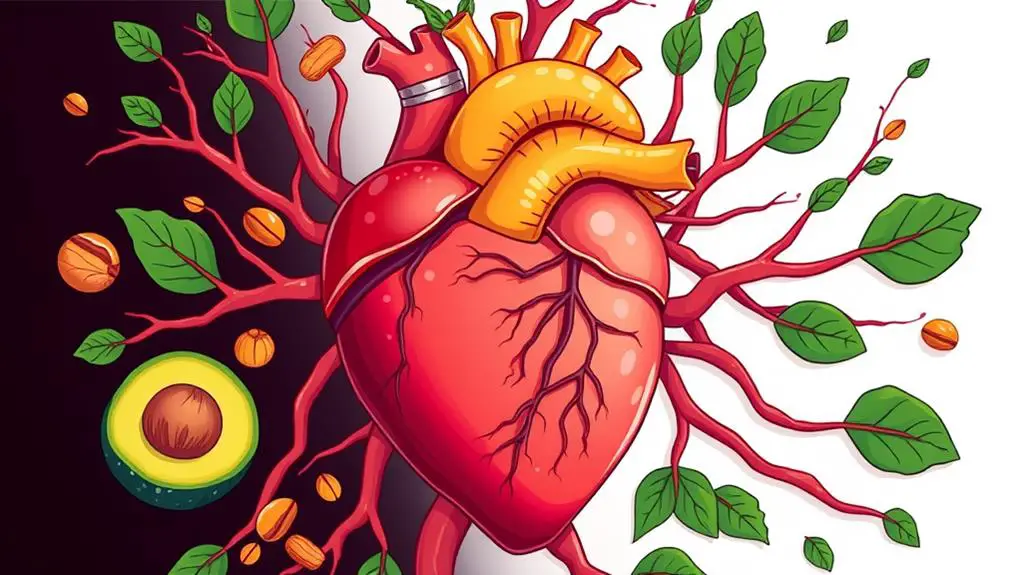
The keto diet, often called "miracle" for its benefits, can help you shed those stubborn pounds by switching your body to burn fat instead of carbs—pretty cool, right? It's a game changer for your metabolism, helping control blood sugar and reducing hunger. Plus, it can clear your skin, tackle annoying acne, and may even support cancer treatments. And guess what—your heart loves it too, with better cholesterol and blood pressure levels. Not stopping there, keto can supercharge your brain, boosting memory and focus. If you're curious about how else keto can rock your world, stick around!
Key Takeaways
- The ketogenic diet promotes weight loss by using fat for energy, resulting in significant fat reduction.
- It improves metabolic health with better blood sugar control, lower insulin levels, and enhanced fat metabolism.
- Keto stabilizes blood sugar levels, reducing acne and promoting clearer, healthier skin.
- The diet supports cardiovascular health by improving cholesterol profiles and reducing blood pressure.
- Ketones produced on the keto diet enhance brain function, improving mental clarity and memory.
Weight Loss
Weight loss remains one of the most prominent benefits of the ketogenic diet, primarily due to its ability to induce ketosis—a metabolic state where the body utilizes fat for energy instead of carbohydrates. This unique process often leads to rapid weight loss.
On average, men lose around 18 kg and women about 11 kg over 56 weeks of dietary adherence. Imagine shedding those extra pounds while enjoying your meals!
One standout feature of the keto diet is its ability to deliver sustainable results. Studies show that keto dieters can lose 2-5 lbs more than those on low-fat diets within the first six months to a year.
This is not just about losing weight fast; it's about keeping it off. The diet's high fat and protein content keeps you full longer, reducing appetite and making it easier to stick to your eating plan.
Moreover, the keto diet specifically targets visceral fat—the risky kind that surrounds essential organs and is linked to serious health issues like diabetes and heart disease.
Long-term adherence to keto doesn't just help you lose weight; it transforms your body composition, making you healthier overall.
Metabolic Health
When it comes to metabolic health, the keto diet truly shines.
By switching the body's fuel source to fat, it enhances fat metabolism and helps regulate appetite hormones, making it easier to manage cravings.
This can lead to better blood sugar control, lower insulin levels, and even improvements in cholesterol, making the keto diet a powerful tool for overall metabolic health.
Enhanced Fat Metabolism
Enhanced fat metabolism is a cornerstone of the ketogenic diet, which shifts the body's primary energy source from glucose to ketone bodies. This shift increases fat oxidation, making the body more energy efficient. Imagine your body as a hybrid car, switching from gasoline to electricity. It's a smart change that helps you burn fat more effectively.
Research shows that people on a keto diet not only shed body fat, but also keep their muscle mass intact. This is like hitting two birds with one stone: you lose weight but stay strong!
A meta-analysis found that sticking to a low-carb keto diet can lead to 2-3 times more weight loss compared to low-fat diets. Why? Because your body becomes a fat-burning machine, efficiently breaking down stored fat for energy.
Another cool fact: lower insulin levels on a keto diet make it easier for your body to tap into fat stores. Plus, studies have shown that the keto diet lowers triglycerides and boosts HDL, the good cholesterol.
This means better metabolic health and a lower risk of heart disease. So, not only do you look better, but you also feel better!
Appetite Hormone Regulation
Regulating appetite hormones is another vital advantage of the ketogenic diet, contributing to improved metabolic health. The keto diet plays a key role in hormone balance by markedly reducing levels of ghrelin, the hunger hormone. This decrease in ghrelin promotes a natural reduction in appetite, making it easier to stick to dietary goals without feeling constantly hungry. Research shows that people on low-carb diets like keto experience an automatic reduction in appetite, leading to lower calorie consumption.
The increased intake of fats and proteins on the keto diet further aids in appetite control by enhancing feelings of fullness and satiety. This makes it simpler to maintain weight loss efforts over time. For instance, a meta-analysis found that individuals on ketogenic diets lost an average of 5 lbs more than those on low-fat diets after six months, partly due to better appetite regulation.
Moreover, the reduction in hunger hormones not only supports weight loss but also helps stabilize blood sugar levels and minimize insulin spikes, which are essential for long-term metabolic health.
| Hormone | Impact of Keto Diet | Result |
|---|---|---|
| Ghrelin | Markedly reduced | Decreased appetite |
| Insulin | Lower spikes | Stabilized blood sugar |
| Leptin | Enhanced sensitivity | Improved satiety |
| Peptide YY | Increased levels | Better appetite control |
Skin Benefits
The ketogenic diet offers several skin benefits, primarily through its impact on blood sugar and inflammation. One major perk is acne reduction. When you eat fewer carbs, your blood sugar levels stay more stable, which means fewer insulin spikes. Those spikes are like tiny fireworks for acne, making it worse. So, by keeping blood sugar steady, the keto diet can keep your skin clearer.
Plus, it helps with skin hydration. Eating lots of healthy fats like avocados and nuts keeps your skin moisturized from the inside out.
A 2012 study backs this up, showing that lower carbohydrate intake can reduce inflammation and improve skin health. Processed carbs, like the ones in sugary snacks and white bread, are known troublemakers for your skin. By cutting these out, the keto diet helps you dodge those skin issues. Imagine having fewer breakouts and better overall skin appearance!
But the benefits don't stop at acne. The anti-inflammatory properties of the keto diet can also help with other skin conditions, like psoriasis and eczema.
Cancer Support
When it comes to cancer support, the keto diet shows promising benefits.
It may help cancer treatments like chemotherapy by making cancer cells weaker and more likely to die, thanks to the increased oxidative stress.
Plus, by lowering blood sugar levels, the diet could reduce certain cancer risks linked to insulin, making it a potential ally in cancer prevention.
Complementing Cancer Treatments
Emerging evidence suggests that the ketogenic diet holds promise as an adjunct to conventional cancer treatments, potentially enhancing their effectiveness. For patients traversing the rough waters of cancer treatment, nutritional strategies like the keto diet can make a significant difference. Lowering blood sugar levels through this diet may reduce insulin-related cancer risks, offering a protective shield against certain types of cancer.
Patient experiences indicate that the ketogenic diet can help stabilize blood sugar levels, which is essential for maintaining overall health during treatment. Fluctuating blood sugar can negatively impact the efficacy of chemotherapy and other treatments.
Additionally, the keto diet's ability to promote significant weight loss and improve metabolic health can be beneficial in managing the often debilitating side effects of cancer therapies.
Furthermore, some studies suggest that this dietary approach may enhance the quality of life for cancer patients by reducing inflammation and boosting energy levels. While more research is needed, the potential benefits are promising.
Integrating the ketogenic diet into cancer care could offer a multifaceted approach to support patients, making their journey through treatment a bit more manageable.
Oxidative Stress Induction
Beyond its potential role in stabilizing blood sugar levels and enhancing conventional cancer treatments, the ketogenic diet may also support cancer therapy by inducing oxidative stress in cancer cells. This oxidative stress can promote cancer cell death and potentially make chemotherapy more effective. The ketosis mechanisms of the diet lead to metabolic changes that result in the increased production of reactive oxygen species (ROS). These ROS selectively target cancer cells, causing damage while sparing healthy cells.
The table below summarizes key points about how the ketogenic diet influences cancer cells:
| Mechanism | Impact on Cancer Cells |
|---|---|
| Lowered Blood Sugar | Reduces glucose availability |
| Increased ROS Production | Induces oxidative stress |
| Metabolic Changes | Promotes cancer cell death |
Research shows that by lowering insulin levels and glucose availability, the ketogenic diet effectively starves cancer cells, especially those that rely heavily on glucose for energy. A 2018 study highlighted this effect, suggesting that the diet's ability to reduce insulin-related cancer risks might offer protective benefits against certain types of cancer. While more research is needed to fully understand these effects, the initial findings about oxidative stress induction are promising. By leveraging ketosis mechanisms, the ketogenic diet holds potential as a supportive strategy in cancer therapy.
Insulin-Related Cancer Risks
The ketogenic diet, often characterized by its low carbohydrate and high fat content, may offer significant benefits in reducing insulin-related cancer risks. Lowering insulin levels can be vital since high insulin is linked to the proliferation of cancer cells. Imagine a world where cancer cells struggle to find their next meal—this is one potential effect of the keto diet.
A 2018 study found that reduced blood sugar and insulin from the keto diet could decrease the risk of insulin-related cancers. But remember, more research is needed for conclusive evidence. The keto diet puts your body in a metabolic state with low glucose availability, potentially starving certain cancer cells of the energy they need to grow. This idea aligns with the Warburg effect, which indicates that many cancer cells prefer glucose for energy. Reducing carbs could hinder cancer cell growth.
- Hope: Lower insulin levels may bring hope to those fearing cancer.
- Relief: A potential diet change could mean a future with fewer cancer worries.
- Empowerment: Taking control of your diet might give you power over your health.
While these findings are promising, further studies are essential to fully understand the long-term effects of ketogenic diets on cancer risk and treatment outcomes.
Cardiovascular Health

Although often associated with weight loss, the ketogenic diet also offers substantial benefits for cardiovascular health. One major advantage is its positive impact on cholesterol management. Studies have shown that following a keto diet can lower LDL (bad cholesterol) and triglycerides while boosting HDL (good cholesterol). This shift in cholesterol levels is essential because higher HDL levels and lower triglycerides are linked to a reduced risk of heart disease.
Blood pressure control is another significant benefit. Research indicates that people on a ketogenic diet often experience notable drops in both systolic and diastolic blood pressure. Lower blood pressure means less strain on your heart and arteries, leading to better overall heart health.
But that's not all. The keto diet helps reduce visceral fat, the dangerous fat stored around your organs, which is a big risk factor for cardiovascular disease. By trimming down this abdominal fat, your heart gets a much-needed break.
Improved insulin sensitivity is another win for your heart. By keeping blood sugar levels in check, the keto diet helps prevent type 2 diabetes, a major heart disease risk factor.
All these factors combined make the ketogenic diet a powerful tool for enhancing cardiovascular health.
Cognitive Enhancement
Harnessing the power of ketones, the ketogenic diet offers promising benefits for cognitive enhancement. When you switch to a keto diet, your body starts producing ketones, which act as a super fuel for your brain. This can lead to improved mental clarity and better memory retention. Imagine being able to think more clearly, even on a Monday morning!
Studies have shown that ketones can boost cognitive performance and help banish that annoying "brain fog" you sometimes get after a high-carb meal. And it's not just about feeling sharper; there are some serious perks, too. Research suggests the ketogenic diet might help protect your brain from diseases like Alzheimer's. That's a big deal, right?
To make things even better, here are some emotional highlights:
- Enhanced focus: Imagine feeling like a superhero in school, totally on top of your game.
- Improved mood: Say goodbye to the grumpy blues and hello to a happier you.
- Mental clarity: Picture a fog-free brain, where everything just clicks.
Kids with epilepsy have even seen fewer seizures on a keto diet, showing just how powerful it can be for brain health.
Frequently Asked Questions
What Are the Health Benefits of Eating Keto?
The ketogenic diet offers numerous health benefits, including weight loss, enhanced mental clarity, improved energy levels, reduced inflammation, better digestion, stabilized blood sugar, improved heart health, and effective appetite control. These benefits collectively promote overall well-being.
What Are Pros and Cons of Keto?
The keto diet offers benefits such as rapid weight loss and improved blood sugar control but involves side effects like the "keto flu" and potential nutrient deficiencies. Common misconceptions include its long-term sustainability and impact on heart health.
What Happens to Your Body When You Do Keto?
When you follow a keto diet, your body undergoes significant metabolic changes, primarily shifting to burning fat for energy, which can enhance energy levels, promote fat loss, stabilize blood sugar, and improve cognitive function and heart health.
Why Is Keto so Effective?
Keto is effective due to ketosis, promoting fat loss while retaining muscle. Despite keto misconceptions, its sustainability is supported by increased satiety, stabilized blood sugar, and improved insulin sensitivity, making it beneficial for long-term health management.
Conclusion
The keto diet offers several benefits, including weight loss, improved metabolic health, and better skin. It also shows promise in supporting cancer treatment, enhancing cardiovascular health, and boosting cognitive function. While some may find the diet challenging to stick to, its potential advantages make it worth considering. As with any diet, consulting with a healthcare professional before starting is essential to guarantee it aligns with individual health needs and goals.









No Comments